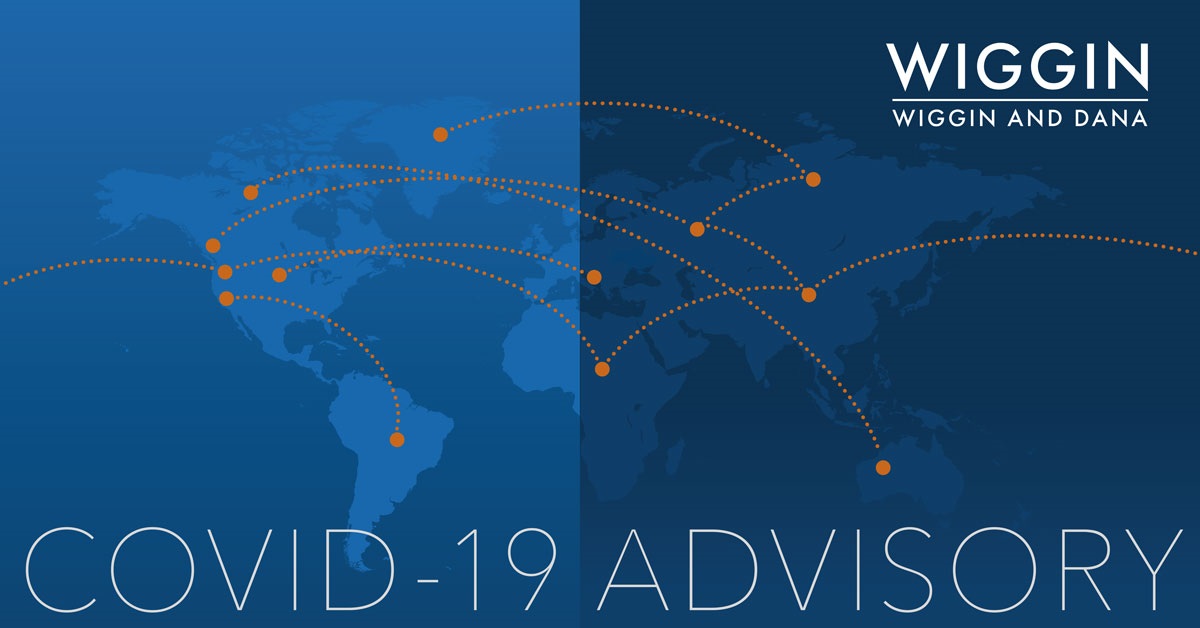COVID-19 Client Resources and Updates

Executive Order 7U Establishes Immunity for Health Care Providers Responding to COVID-19
On March 17, 2020, the federal government published a Declaration in the Federal Register providing immunity from liability under state and federal law to certain individuals and entities using medical countermeasures in the fight against COVID-19. However, as we explained in our earlier alert, the scope of the Declaration was ambiguous. Several individual states, especially those calling on retired health care providers to return to service, also took action to establish immunity for those providers.
On April 5, 2020, the Governor of the State of Connecticut, Ned Lamont, joined the growing number of governors recognizing the need to provide liability protections for health care workers during this public health emergency. Executive Order 7U establishes immunity from civil suit for health care providers working in support of the State’s COVID-19 response.
Executive Order 7U is a very positive development for health care providers in Connecticut.
Who is Afforded Immunity from Suit?
The Executive Order applies to “health care professionals” and “health care facilities,” as defined in the Order as follows:
- “Health care professional” means any individual who is licensed, registered, permitted, or certified in any state in the United States to provide health care services and any retired professional, professional with an inactive license, or volunteer approved by the Commissioner of the Department of Public Health.
- “Health care facility” includes a licensed or state approved hospital, clinic, nursing home, field hospital or other facility designated by the Commissioner of Public Health for temporary use for the purpose of providing essential services in support of the State’s COVID-19 response.
Of note, the Commissioner may designate some of the spaces being utilized for additional surge capacity as “other” facilities under this provision defining “health care facility.” The inclusion of retired health care professionals with an inactive license is also important. The Order expressly recognizes that:
[I]n order to respond adequately to the public health emergency posed by the COVID-19 pandemic, it has been necessary to supplement Connecticut’s health care workforce and the capacity of health care facilities to deliver life-saving care by requesting the assistance of health care professionals who have not previously maintained liability coverage; facilitating the deployment of volunteer and out-of-state healthcare professionals; and calling upon healthcare professionals to perform acts that they would not perform in the ordinary course of business.
Executive Order 7U, page 2. The Order recognizes that there is a compelling state interest in affording such health care providers protection against liability, in order to encourage maximum participation in efforts to expeditiously expand Connecticut’s health care workforce and facility capacity. Id.
Notably absent – and urgently needed – is the provision of immunity from suit for home health care, assisted living services agencies, and others assisting in the fight for lives. It is important to the public interest to keep certain (elderly, immuno-compromised) patients home and out of the hospitals – now more than ever – and home health care and assisted living services agencies are critical to those efforts. And, there is ample precedent from other states for including home health care agencies within the scope of immunity protections provided to health care providers in the wake of COVID-19. See New Jersey Executive Order 112 (providing immunity to “health care facilities” as defined in NJSA 26:13-2, which includes home health agencies and is defined broadly enough to include assisted living communities as well) (issued April 1, 2020).
What activities are immune from suit?
Order 7U provides immunity from suit for civil liability for any injury or death that is allegedly due to the individual’s or facility’s acts or omissions undertaken in good faith while providing health care services in support of the State’s COVID-19 response.
This immunity protection specifically includes acts or omissions undertaken due to a lack of resources attributable to the COVID-19 pandemic, which impacts the health care professional’s or facility’s ability to provide the level or manner of care that would otherwise have been required. The protections retroactively apply to any acts or omissions subject to the order which have occurred since Governor Lamont declared a public health and civil preparedness emergency on March 10, 2020.
Treatment of COVID-19 patients would certainly be covered as an act or omission “in support of the State’s COVID-19 response.” The protections are much more inclusive than just treatment of COVID-19 patients, however. The Order also covers acts or omissions undertaken because of a lack of resources attributable to the COVID-19 pandemic which renders the health care professional or facility unable to provide the level or manner of care that would otherwise have been required. This arguably could provide immunity from suit for an act or omission involving a patient who does not have a COVID-19 diagnosis, but whose care and treatment was impacted by the scarcity of resources the pandemic has created.
Of note, the immunity protection has limits. It does not insulate a provider or facility from suit for civil liability for any acts or omissions that constitute a crime, fraud, malice, gross negligence, or willful misconduct.
The liability protections provided in Order 7U are welcome and will provide some much needed comfort to health care providers who are tasked with making difficult treatment decisions involving the allocation of resources.
On April 7, 2020, Governor Lamont issued Executive Order 7V, which clarified that the immunity protections outlined in Executive Order 7U also apply to civil suits pursuant to the common law, in addition to the Connecticut General Statutes.
****
Visit Wiggin and Dana’s COVID-19 Resource Center here for additional publications and helpful links on multi-disciplinary topics that are relevant during the current COVID-19 global pandemic.


